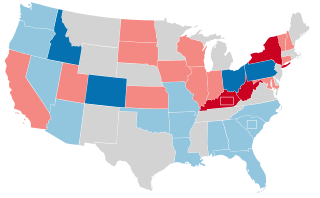
Romania's political framework is a semi-presidential representative democratic republic where the Prime Minister is the head of government while the President, according to the constitution, has a more symbolic role, is responsible for the foreign policy, signs certain decrees, approves laws promulgated by the parliament, and nominates the head of government. Romania has a democratic, multi-party system, with legislative power vested in the government and the two chambers of the Parliament, more specifically the Chamber of Deputies and the Senate. The judiciary is independent of the executive and the legislature. From 1948 until 1989, the communist rule political structure took place in the framework of a one-party socialist republic governed by the Romanian Communist Party (PCR) as its only legal party.
A by-election, also known as a special election in the United States and the Philippines, and a bye-election or a bypoll in India, is an election used to fill an office that has become vacant between general elections.

The Colombian Liberal Party is a centre to centre-left political party in Colombia. It was founded as a classical liberal party but later developed a more social-democratic tradition, joining the Socialist International in 1999.

The Liberal Party was a conservative political party of Brazil, active from 1985 to 2006. The Pentecostal Universal Church of the Kingdom of God heavily influenced the party after 1999. In the 2002 election, José Alencar of the PL was elected vice president as the running mate of Luiz Inácio Lula da Silva. At the legislative elections on 6 October 2002, the party won 26 out of 513 seats in the Chamber of Deputies and three out of 81 seats in the Senate of Brazil and supported Luiz Inácio Lula da Silva's government. Some of its members were investigated following corruption allegations and suspected involvement in the so-called "Mensalão scandal". The Universal Church-led faction then left the PL to create a new party named Brazilian Republican Party (PRB) in 2005.

The 1996 United States Senate elections were held on November 5, 1996, with the 33 seats of Class 2 contested in regular elections. Special elections were also held to fill vacancies. They coincided with the presidential election of the same year, in which Democrat Bill Clinton was re-elected president.

The 1980 United States Senate elections were held on November 4, coinciding with Ronald Reagan's victory in the presidential election. The 34 Senate seats of Class 3 were contested in regular elections. Reagan's large margin of victory over incumbent Jimmy Carter gave a huge boost to Republican Senate candidates, allowing them to flip 12 Democratic seats and win control of the chamber for the first time since the end of the 83rd Congress in January 1955. This was the first time since 1966 that any party successfully defended all their own seats.

The 1956 United States Senate elections were elections for the United States Senate that coincided with the re-election of President Dwight D. Eisenhower. The 32 seats of Class 3 were contested in regular elections, and three special elections were held to fill vacancies. Although Democrats gained two seats in regular elections, the Republicans gained two seats in special elections, leaving the party balance of the chamber unchanged.

The 1948 United States Senate elections were held concurrently with the election of Democratic President Harry S. Truman for a full term. The 32 seats of Class 2 were contested in regular elections, and one special election was held to fill a vacancy. Truman campaigned against an "obstructionist" Congress that had blocked many of his initiatives, and additionally, the U.S. economy recovered from the postwar recession of 1946–1947 by election day. Thus, Truman was rewarded with a Democratic gain of nine seats in the Senate, enough to give them control of the chamber. This was the last time until 2020 that Democrats flipped a chamber of Congress in a presidential election cycle.

The Colombian Conservative Party is a conservative political party in Colombia. The party was formally established in 1849 by Mariano Ospina Rodríguez and José Eusebio Caro.

National Renewal is a liberal conservative political party in Chile. It is a member of Chile Vamos, a centre-right to right-wing coalition. Sebastián Piñera, the former President of Chile, was a member of the party.

The National Encounter Party is a political party in Paraguay.
Split-ticket voting or ticket splitting is when a voter in an election votes for candidates from different political parties when multiple offices are being decided by a single election, as opposed to straight-ticket voting, where a voter chooses candidates from the same political party for every office up for election. Split-ticket voting can occur in certain mixed-member systems which allow for it, such as mixed-member proportional and parallel voting systems.

Parliamentary elections were held in Romania on 30 November 2008. The Democratic Liberal Party (PDL) won three more seats than PSD in the Chamber of Deputies and the Senate, although the alliance headed by the Social Democratic Party (PSD) won more votes and a fractionally higher vote share. The two parties subsequently formed a governing coalition with Emil Boc of the PDL as Prime Minister.

The Conservative Party of Chile was one of the principal Chilean political parties since its foundation in 1836 until 1948, when it broke apart. In 1953 it reformed as the United Conservative Party and in 1966 joined with the Liberal Party to form the National Party. The Conservative Party was a right-wing party, originally created to be the clericalist, pro-Catholic Church group.
The Democrats was a centre-right political party in Brazil that merged with the Social Liberal Party to found the Brazil Union in 2021. It was founded in 1985 under the name of Liberal Front Party from a dissidence of the defunct Democratic Social Party (PDS), successor to the National Renewal Alliance (ARENA), the official party during the military dictatorship of 1964–1985. It changed to its current name in 2007. The original name reflected the party's support of free market policies, rather than the identification with international liberal parties. Instead, the party affiliated itself to the international federations of Christian-democratic (CDI) and conservative parties (IDU). The Democrats' identification number is 25 and its colors are green, blue, and white.

The 2000 United States Senate election in Pennsylvania was held on November 7, 2000, during a year which coincided with a United States presidential election in which Pennsylvania was viewed as a swing state. Pennsylvania was one of four states that elected Republican Senators despite being won by Al Gore in the concurrent presidential election, the others being Maine, Rhode Island and Vermont.

The 1980 United States elections were held on Tuesday, November 4. Republican presidential nominee Ronald Reagan defeated incumbent Democratic President Jimmy Carter in a landslide. Republicans picked up seats in both chambers of Congress and won control of the Senate, though Democrats retained a majority in the House of Representatives. The election is sometimes referred to as part of the "Reagan Revolution", a conservative realignment in U.S. politics and marked the start of the Reagan Era.

The 1988 United States elections were held on November 8 and elected the president of the United States and members of the 101st United States Congress. Republican Vice President George H. W. Bush defeated Democratic Governor of Massachusetts Michael Dukakis. Despite Dukakis' defeat, the Democratic Party built on their majorities in Congress.
Presidential elections were held in Colombia on 5 May 1946, pitching the Colombian Conservative Party against two different Colombian Liberal Party candidates. The Liberals received more votes combined, but due to their division the result was a victory for Mariano Ospina Pérez of the Conservative Party, who received 41.4% of the vote. One of the Liberal candidates, Gabriel Turbay, was also supported by the Social Democratic Party.
A landslide victory is an election result in which the victorious candidate or party wins by an overwhelming margin. The term became popular in the 1800s to describe a victory in which the opposition is "buried", similar to the way in which a geological landslide buries whatever is in its path. A landslide victory is the opposite of an electoral wipeout; a party which wins in a landslide typically inflicts a wipeout on its opposition. What constitutes a landslide varies by the type of electoral system. Even within an electoral system, there is no consensus on what sized margin makes for a landslide.















